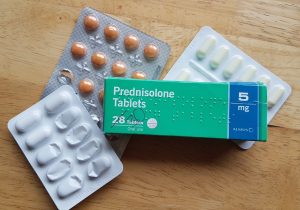What are the 10 most common steroid drugs?
We will describe what are the 10 most common steroid tablets? But a bit of background first.

Prednisolone – the commonest steroid tablet
What are steroid tablets?
Steroid tablets, also called corticosteroid tablets, are a type of anti-inflammatory medicine used to treat a range of conditions.
- Inflammatory bowel diseases (e.g. Crohn’s disease, ulcerative colitis)
- Autoimmune diseases (e.g. systemic lupus erythematosus (SLE), autoimmune hepatitis, glomerulonephritis and vasculitis)
- Multiple sclerosis (MS) relapses
- Joint and muscle diseases (e.g. rheumatoid arthritis)
- Allergies
- Asthma/chronic obstructive pulmonary disease (COPD)
- Giant cell arteritis and polymyalgia rheumatica
- Certain infections, including croup, COVID-19 and increasingly pneumonia.
Types of corticosteroids
Corticosteroids are available in different forms, including:
- Tablets (oral steroids) – dissolvable and liquid versions are also available. Steroid tablets are only available on prescription.
- Injections – which can be into blood vessels, joints or muscles
- Inhalers – like mouth or nasal sprays
- Lotions, gels or creams (topical steroids)
So. What are the 10 most common steroid tablets?
Most steroid tablets are glucocorticoids:
- Prednisolone
- Methylprednisolone
- Betamethasone – cream
- Dexamethasone
- Hydrocortisone – IV, tablets or cream
- Deflazacort – e.g used for Duchenne muscular dystrophy
- Beclometasone – inhaler or nasal spray
- Fluticasone – inhaler or nasal spray
- Budesonide – rectal foam or enema
- Fludrocortisone. This is from another group called mineralocorticoids. This is the type usually used for replacing steroids the body is not producing itself.
Most steroids are only available on prescription, but a few (such as some creams or nasal sprays) can be bought from pharmacies and shops.
How and when to take steroid tablets
Take your medicine as instructed by your doctor. They’ll explain how much to take and how often.
It’s normally best to take steroid tablets with or soon after a meal – usually breakfast – because this can stop them irritating your stomach.
If you miss a dose or take too much
If you forget a dose, take it as soon as you remember. If it’s almost time for your next dose, skip the one you missed.
Do not take a double dose to make up for a forgotten dose.
Taking too many steroid tablets over a long period can make you more likely to get side effects.
Coming off treatment
Do not stop taking your medicine without talking to your doctor.
If you have been taking steroid tablets for more than a few weeks, you usually need to reduce your dose gradually. Stopping suddenly can cause your adrenal gland, which makes important hormones for the body, to stop working. This is known as adrenal insufficiency.
Symptoms of adrenal insufficiency
These include:
- Feeling extremely tired
- Feeling and being sick
- Dizziness
- Loss of appetite and weight loss.
Your original symptoms may also come back suddenly.
Your doctor will be able to provide more advice about how to safely stop taking steroids.
Side effects of steroid tablets
Taking steroid tablets for less than 3 weeks is unlikely to cause any significant long-term side effects. But you may get some side effects if you need to take them for longer, at a high dose or if you need frequent courses.
Steroid tablets are strong and have alot of side-effects. Steroid tablets taken for longer than 4 weeks can cause:
- Increased appetite – which may lead to weight gain if you find it difficult to control what you eat
- Rapid mood swings and mood changes – aggression, insomnia, being irritable and short-tempered with people
- More serious mental health problems – like depression, suicidal thoughts, anxiety, confusion and hallucinations. If you have serious depression or suicidal thoughts, see your GP urgently or call NHS111
- Thin skin that bruises easily
- Muscle weakness
- Delayed wound healing.
Longer term side-effects
- Central obesity (around your middle)
- Acne and striae (stretch marks)
- Cushing’s syndrome
- Weakening of the bones (osteoporosis)
- Diabetes (or they may worsen existing diabetes)
- High blood pressure
- Glaucoma and cataracts (eye conditions)
- Stomach ulcers
- Increased risk of infections, particularly chickenpox, shingles and measles
- Reduced growth in children.
Summary
We have described what are the 10 most common steroid drugs. We hope it has been helpful.

